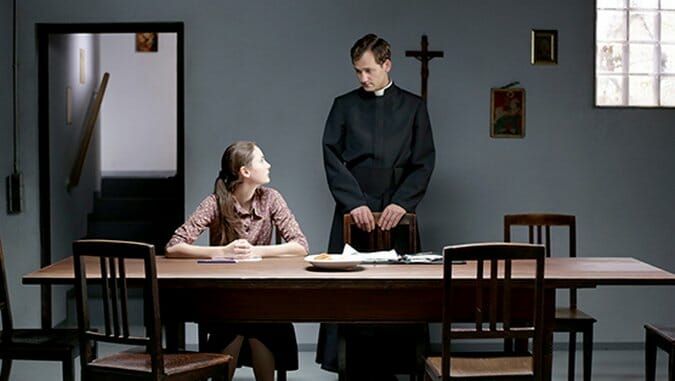
The opening shot of Dietrich Brüggemann’s brilliantly stark, cold and difficult Stations of the Cross, composed as if it’s an homage to Leonardo da Vinci’s “The Last Supper”, joins Father Weber (Florian Stetter) as he tells his small classroom of students about the sacrifices God asks of them every day. His young disciples are preparing for their confirmation in the orthodox Catholic Church, none quite as determinedly as 14-year-old Maria (Lea Van Acken), who questions Weber if one could sacrifice his or her entire self to God in order to help others. From there, Stations of the Cross parallels the 14 steps in Jesus’s journey to Calvary (and martyrdom) through 14 single-shot scenes, showing us Maria’s attempt to similarly give herself up for the benefit of others—namely for her possibly-autistic brother to be able to finally speak—regardless of the consequences.
Maria’s desire to please God weighs heavily upon her in each scene, coupled with her maturation into a young woman amidst a secular world that combats her beliefs. Father Weber has taught her that almost anything can and should be a sacrifice to God, that she should fight any temptations in any way possible. Weber even questions her choice to have a cookie; after all, not eating one could in itself be a gift to God. (During confession he asks her if she’s looked away from billboards with questionable morals.) This type of thinking has been so ingrained into Maria (whose name is itself a sort of catch-all religious symbol for piety), she feels the need to hide her friendship with a boy from her mother (Franziska Weisz) and questions the choice of a Protestant teacher at school to play such evil music during gym class as Roxette’s “She’s Got the Look.”
Lea Van Acken’s heartbreaking performance allows Maria to be a sympathetic character, even though she’s orchestrating her own downfall. Through the lessons from Weber and her equally close-minded mother (Franziska Weisz), she feels like her actions are justified, even when doctors, students and the family’s au pair Bernadette (Lucie Aron) point out the hypocrisies of her beliefs and the dangers of intolerance. Sibling cowriters Dietrich and Anna Brüggemann, who have had experience in such German orthodox churches, write Maria not as someone ignorant, but as a believer intentionally fighting off the advances of Satan, even as these spiritual tests come through people she should trust. The script never sets out to persecute Maria for her beliefs, instead successfully trying to show the mindset of someone who could make such a choice to put others before herself, even when the majority of people in her life can’t understand her actions. The Brüggemann’s have poised Maria as a character straddling the line between devout believer and possibly brainwashed child.
Dietrich Brüggemann’s composes his 14 shots simply, almost always leaving the camera in one place and allowing the audience to focus on the intuitive balance between characters and the beliefs within those characters, which leads to both frustrating and fascinating dynamics scene after scene. When Brüggemann does finally move the camera—still only slightly—it’s almost shocking.
Brüggemann’s conceit, however, doesn’t always sync up with the story he is telling. The framing of Maria’s travails through Jesus’s crucifixion isn’t an exact science, yet the similarities between the two stories do demonstrate Maria’s unfortunate desperation and determination in her goal. Even though Stations of the Cross does seem to condemn Maria’s actions, the later chapters in the film also make it clear that Maria is possibly onto something. Not only do the film’s final chapters conflict with her larger narrative by giving Maria’s ideology plenty of credence, if subtly, it almost gives credibility to the harshness of those beliefs while still criticizing her extreme choices.
Along with recent greats like Ida and, more directly, Cristian Mungiu’s Beyond the Hills, Stations of the Cross belongs among the decade’s best films about the lengths one must go to in order to balance strong beliefs with a tolerance toward a secular world that fights against those beliefs. At times, it’s even reminiscent of Ingmar Bergman’s rumination on religious stoicism, Winter Light. Brüggemann’s Stations of the Cross fantastically dissects the power of faith—whether that’s a positive or a negative endeavor, God knows.
Director: Dietrich Brüggemann
Writers: Anna Brüggemann, Dietrich Brüggemann
Starring: Lea van Acken, Franziska Weisz, Florian Stetter, Lucie Aron
Release Date: July 10, 2015 (limited)
Ross Bonaime is a D.C.-based freelance writer and regular contributor to Paste. You can follow him on Twitter.